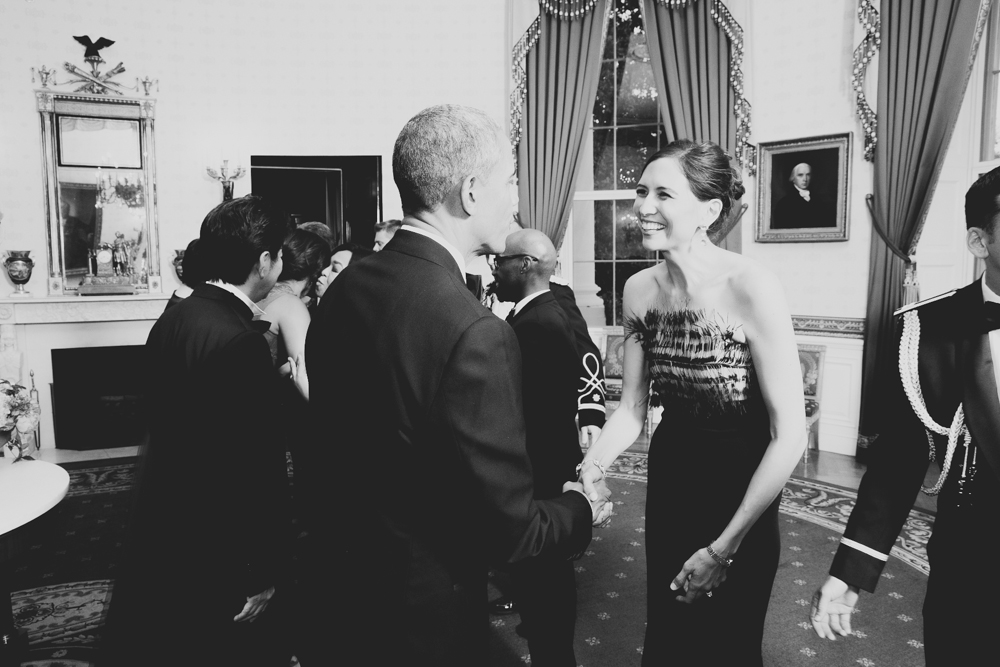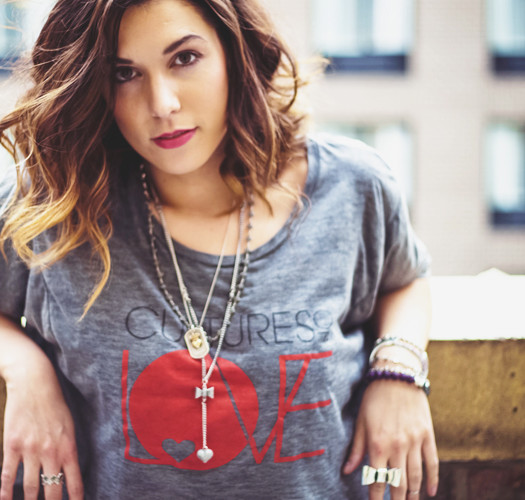Tell Your Story: How Finding Your True Voice Creates Confidence and Opportunity

Image by The White House. Sabrina Moyle shaking the hand of President Obama at the Japan State Dinner
This article, while has many facets, I want to start and end with How Facebook could help us fulfill our human potential—hear me out. I recently became one of remaining 18% of people in my peer group to get on Facebook. I’m a 40-year-old mother of three young boys and the co-owner of a small business. When Facebook became a thing, more than a decade ago, I couldn’t imagine wasting my time sharing cat videos and random banter with people I knew in high school. I had too many other important things to do.
That all changed this year. For one thing, I’ve been out of the woods. My small business is finally stable after 10 years of blood, sweat and tears, thanks to the hard work of faithful employees and to finally releasing assumptions about what it means be a successful entrepreneur in the Bay Area (VC funding, massive scale, disruption). Mine is an old school letterpress card business, created from pure love, small and beautiful. My kids—5 year old fraternal twins and a 3 year old, all boys—are finally out of diapers and in school. I’ve finally been able to come up for air.
And oh, how good it feels to breathe. The shift began two years ago, when I began the process of what I’ll call waking up, otherwise known as my cocoon phase. Thanks to restructuring my business, I had free time for the first time in a decade. I decided to use it to reflect and reassess my life, for self-inquiry.
I read dozens of books, began meditating from time to time, traded in my sweatpants, maternity shirts and sneakers for a wardrobe that better reflects who I am inside, shifted to a low-sugar diet, spent time with my kids, and read some more. I emerged with a clear sense of life purpose; an integrated inner knowing of my past and how each dot, each decision and experience (there are no “bad” experiences, though some may be painful), connects to create who I am today and informs who will be in the future; and a voice—both metaphorical and physical—that is strong, clear, and true.
In finding my voice and using it, magical things began to happen. Last February, through a local trade association, I was invited to attend a briefing on the Obama administration’s international trade agenda led by Secretary of Commerce Penny Pritzker. Prior to the invitation, I had given zero thought to trade policy. But because I was now in touch with my voice, the moment I saw the briefing agenda, I made connections between what the Secretary needed and my own experience. I jotted down a few notes on international trade based on my personal experiences as a small business owner: that overseas markets present an incredible opportunity due to ecommerce, but that high and unpredictable customs fees, byzantine paperwork, and international shipping costs present often insurmountable barriers to small business owners who are time and resource constrained.
At the briefing, which consisted of about 30 business owners and government officials, I spoke out clearly and passionately, leaning into my intuition without second-guessing the inherent worth of what I had to say. Afterwards, the Secretary remarked to me in passing, “You have a beautiful way of expressing yourself,” and I was invited to attend a half day briefing on trade policy at the White House. With my newfound voice, I began writing blog posts on international trade from a small business perspective and started a campaign called Share Trade, which I hoped would go viral on social media but didn’t; it turns out that few people are willing to speak out publicly on a divisive issue like free trade, particularly as the contents of the TPP (TransPacific Partnership) were then secret.
In April, I was invited to the Japan State Dinner, hosted by President and Mrs. Obama at the White House in honor of Prime Minister Shinzo Abe. The call from the White House social secretary came while I was with my kids at swimming class. I assumed it was a telemarketer since there was No Caller ID, but thankfully answered anyway. The email invitation had ended up in my spam folder, I later learned (really, Sergey and Larry, could you not write a line of code to ensure that emails from the White House aren’t filtered as spam?). They were calling to follow up.
These events might have become simply a surreal blip in my life, but instead I took my newfound process of self-inquiry deeper. I continued to study, to read and explore. The general line of inquiry was something I’ve been following since I was a teenager: Who am I? Why am I here? What does it mean to lead a good life, to live to my highest potential?
The answer, for me, was partly spiritual. Not in a born again, Bible thumping way, or in a New Age hippie dippie way, but in the sense of deeply recognizing my intuition, my inner knowingness that inevitably allows me to act with confidence, be true to myself, and choose the right words and actions. My spiritual awakening also allowed me to recognize and respect the deep intuition, knowingness, interconnectedness, and innate potential for good of every other human being on this planet, though for many it is but a glimmer within an all consuming fight for basic survival, and for others it is shrouded in a fog of fear, shame, and despair laid thick by a culture that gives our inner power away, feeding it to the insatiable beast of consumerism and celebrity.
The answer was also partly scientific. We live in a time of unprecedented scientific research and discovery on the plasticity of the brain, the healing power and biology of spirituality, self compassion and compassion , the health benefits of meditation , and the extrinsic (that is to say, competitive and prosocial) and intrinsic (that is to say, joy and inner peace) advantages of kindness and cooperation .
That brings me to Facebook. I had never felt comfortable getting on Facebook before. I couldn’t imagine posting endless mundane photos of my kids or myself, or contriving reasons to post them—what purpose would that serve, who would really care? I disdained the idea of virtual small talk. I feared Facebook was simply another invitation to put on a mask, to project an idealized version of our lives, to hide our true selves. And an addictive, instantaneous, 24/7 one at that. I didn’t need another treadmill.
But with my newfound voice, I found that I actually have something meaningful to say. I deeply care about my Facebook friends as people, not just as indicators of my popularity—meaningless, fleeting, and self serving plugs in the leaky vessel of my own self-worth.
I realized that my friends on Facebook, which I once disparagingly referred to as “Facebook friends,” could actually become real friends through authentic, positive interactions. I recognized Facebook as a place where each of us can connect the dots of our past and create the world of our future—make good on promises, revive friendships that have been left untended, forgive past hurts, apologize for wrongdoing, clear up misunderstandings, express our gratitude and, above all, our love, and share and live into a positive vision for the future.
At my kids’ preschool, the children’s credo is “Kind and caring friends.” They break it down into three tenants: Take care of your friends’ feelings. Take care of your friends’ bodies. Take care of your school (read: community and environment). They believe that kindness is the innate birthright of every child, and everyone gets to start new every day. We might mess up sometimes, and there are heartfelt and real consequences for breaking the rules, but even discipline comes from a place of love ( discipline comes from the Latin for instruction or knowledge — it is the act of teaching and imparting wisdom, not meting out punishment and shame; therefore to be selfdisciplined is to engage in a process of continuous inquiry and learning, delving ever deeper into selfcompassion and self knowledge).
Facebook gives us the opportunity to enact these basic human values broadly, instantaneously, consistently, and globally. And, since human emotion is contagious, it also gives these values the opportunity to rapidly spread.
So I’d like to propose that we use Facebook intentionally as a vehicle for positive social change and to fulfill our collective innate human potential, through our every post, like, share, and message. Find time in your real life for self-inquiry so that the face you put on Facebook is not a mask, so that you can find and use your true voice and, in so doing, help others to do the same.
If you are an employer or manager, enact or advocate for policies that give people downtime for creativity and self inquiry. Because once we are all speaking out using our true voices and turning our kind and caring thoughts into words and actions, I believe that the logical result will be creativity, connection, innovation, productivity, compassion, and ultimately peace and prosperity for ourselves and for our children. What a beautiful cacophony that will be.
FROM THE EDITOR
At Conscious, we feature powerful stories about global initiatives, innovation, community development, social impact and more. You can read more stories like this and connect with a growing community of global leaders when you join.



